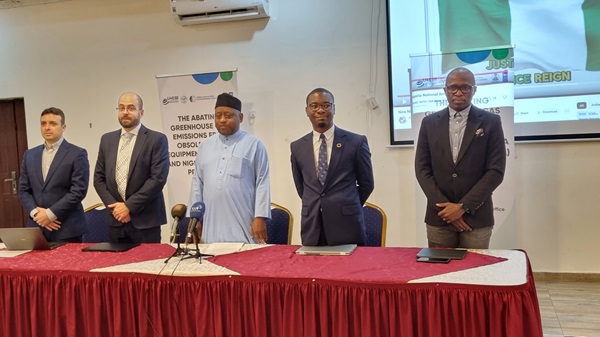
Nigeria has taken a bold step toward reducing greenhouse gas emissions with the launch of the Abating Greenhouse Gas Emission from Obsolete Refrigeration and Air Conditioning (AGORA) Equipment project. This initiative aims to combat climate change by promoting energy-efficient and environmentally friendly cooling technologies.
The project was inaugurated during a workshop organised by the Federal Ministry of Environment, in collaboration with the Energy Commission of Nigeria, the United Nations Environment Programme (UNEP), the United for Efficiency Initiative (UNEP-U4E), and the United Nations Development Programme (UNDP). Themed “Abating Greenhouse Gas Emissions from Obsolete Refrigeration and Air Conditioning Equipment in Ghana and Nigeria (AGORA),” the workshop emphasised the urgent need for sustainable cooling solutions.
Speaking at the event, national ozone officer at the Federal Ministry of Environment, Mr. Idris Abdullahi outlined the project’s goals. “The AGORA project envisions a future where energy-efficient and climate-friendly cooling technologies become the standard,” he said. He added that the project focuses on strengthening policies to transition to low global warming potential (GWP) technologies, thereby reducing greenhouse gas emissions at the end of equipment life.
The initiative is set to last three years and will include establishing regulations, fostering partnerships, and launching ambitious programs to replace outdated and inefficient refrigeration and air-conditioning (RAC) equipment. Abdullahi stressed that this transition will drive market transformation in the RAC sector across Africa, with Nigeria and Ghana as key beneficiaries.
Abdullahi noted Nigeria’s long-standing commitment to the Montreal Protocol, which addresses substances that deplete the ozone layer. Nigeria has also ratified the Kigali Amendment, which mandates the phasedown of hydrofluorocarbons (HFCs), potent greenhouse gases used in cooling systems.
Over the past three decades, Nigeria has implemented measures to phase out ozone-depleting substances in sectors such as refrigeration, air conditioning, and foam production.
The Energy Commission of Nigeria, represented by Dr. Shehu Mustafa emphasised the AGORA project’s role in advancing energy efficiency and promoting sustainable cooling solutions. “This project is pivotal to achieving Nigeria’s climate goals and enhancing sustainable energy access,” he said.
UNDP regional technical advisor for Africa, Mr. Joel Darkwah hailed Nigeria as a leader in implementing the Montreal Protocol. “Nigeria’s proactive approach, including its Kigali Implementation Plan and National Cooling Plan, sets a benchmark for sustainable cooling in Africa,” he said.
Darkwah also highlighted the collaborative nature of the AGORA project. Funded by the French Fund for Global Environment (FFEM), the initiative fosters South-South cooperation between Nigeria and Ghana to exchange best practices and accelerate the adoption of efficient cooling technologies.
The AGORA project focuses on reducing greenhouse gas emissions by replacing obsolete RAC equipment with energy-efficient alternatives. Proper disposal of replaced equipment is a key component to ensure environmental safety.
UNEP-U4E project manager, Mr. Mzwandile Thwala described AGORA as a tool for addressing climate challenges while boosting economic growth. “By promoting low-GWP refrigerants and energy-efficient air conditioners, the project aims to reduce emissions and enhance community well-being,” he explained.
Thwala further emphasised the importance of an integrated policy approach, advocating for policies that facilitate the transition to sustainable cooling solutions.
The launch of the AGORA project underscores Nigeria’s commitment to climate action and sustainable development. With strong partnerships and innovative strategies, the country is poised to lead the way in transforming the RAC sector and reducing greenhouse gas emissions.

